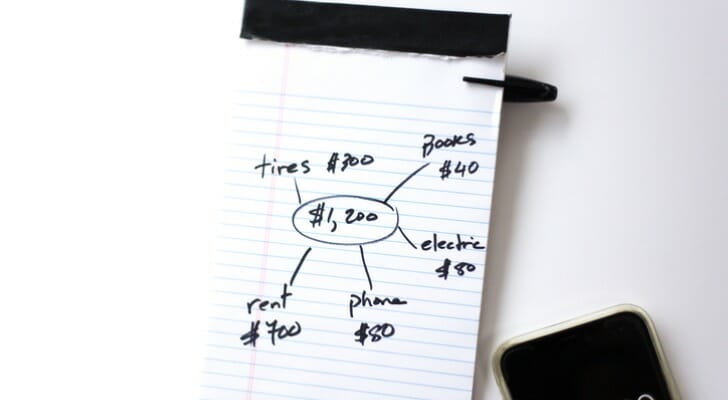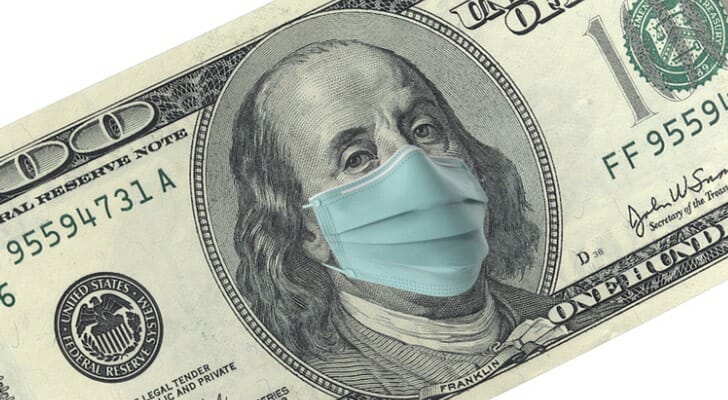The Coronavirus Aid, Relief, and Economic Security (CARES) Act was signed into law on March 27, 2020. The bill includes a number of provisions that help those affected by the coronavirus pandemic. These include expanded unemployment benefits and additional paid sick and family leave. But perhaps the most well known aspect of the CARES Act is the one-time stimulus check payment of up to $1,200 that most Americans are eligible for. These checks are meant to provide some aid to people who might be having financial troubles during the coronavirus crisis. Below, we go through each of the major questions about these stimulus checks so you know exactly what you’re getting and when.
Thinking about investing or saving your stimulus check money? Talk to a financial advisor today.
How Much Will My Stimulus Check Be?
The stimulus check is designed to provide financial support during the coronavirus crisis. With these, the most that any one person can receive is $1,200. That’s the maximum for individuals and heads of household, while married couples can receive up to $2,400. The amount you’ll receive is based on your adjusted gross income, or AGI, on your most recent tax return. Families are also eligible to receive $500 per child under the age of 17.
Individuals who have an AGI higher than $75,000, joint filers with an AGI above $198,000 and heads of household with an AGI over $112,500, will receive reduced checks. More specifically, your stimulus check will decrease in size by $5 for every $100 you make above your associated income threshold. You can use this stimulus check calculator to see your projected amount, or use the following tables:
Stimulus Check Amounts for Single Filers
| AGI | Payment |
| $75,000 | $1,200 |
| $85,000 | $700 |
| $95,000 | $200 |
| $99,000+ | $0 |
Stimulus Check Amounts for Joint Filers
| AGI | Payment |
| $150,000 | $2,400 |
| $170,000 | $1,400 |
| $190,000 | $400 |
| $198,000+ | $0 |
Stimulus Check Amounts for Heads of Household + 1 Child
| AGI | Payout |
| $112,500 | $1,700 |
| $122,500 | $1,200 |
| $132,500 | $700 |
| $146,500+ | $0 |
While these are the federal guidelines, there’s a chance your check won’t be for the right amount. There have been reports of people receiving more or less than what they believed they qualified for. If this happens to you, keep an eye out for contact information in the mail from the IRS 15 days after your check disburses.
When Will I Get My Stimulus Check?

The first in line to receive a stimulus check is anyone who’s filed their taxes in 2018 or 2019 via direct deposit. That’s because the government already has your bank account information on file. As a result, many Americans got their stimulus checks via direct deposit beginning as early as April 11.
If you do not have your bank account on file with the IRS, you’ll receive a paper check. The first physical checks were mailed on April 24. This initial round of paper checks went to those with an AGI of $10,000 or less. Each week after that week, the IRS will increase the AGI threshold by $10,000. Five million paper checks will be mailed every week until all the checks have been sent. This process is expected to stretch into the late summer or early fall.
Through the IRS’ free online tool called “Get My Payment,” you can also go online and submit your direct deposit or mailing information to expedite the process. The tool also allows users to check the payment status of their check. Keep in mind that there have been several glitches with this system, though the Treasury Department says it has fixed many of these issues.
Who Will Get a Stimulus Check?
Beyond just the income marks, you’ll need to meet other specific requirements in order to receive a stimulus check. To be eligible, you need to be either a U.S. citizen or a resident alien. In other words, you need to have a Social Security number. In addition, you’re ineligible for a check if you are over 17 years old and you were claimed as someone’s dependent, which includes most college students.
If you filed your 2019 taxes using any of the following forms, you won’t be eligible for a check:
- Form 1040-NR
- Form 1040NR-EZ
- Form 1040-SS
- Form 1040-PR
Is the Stimulus Check a Loan?
No, your stimulus check is not a loan in the eyes of the federal government or anyone else. You do not need to pay the money in your check back at any point or in any form. You can the funds as you would normal earned income.
Is the Stimulus Check an Advance on 2020 Taxes?
No, your stimulus check is not an advance on your 2020 tax refund. Your stimulus check is not taxable either, so you won’t need to count the money on your 2020 taxes, which you’ll file in early 2021.
How Many Stimulus Checks Will I Receive?
Since these stimulus checks are just one-time payments, each person will only receive a single check. However, that may change if the government decides to do another round of stimulus payments as the coronavirus crisis wears on.
Another exception to this is if your first check was for an incorrect amount. If you’re able to prove that the IRS made a mistake in calculating your AGI, you may be entitled to another check that makes up the difference.
Will Social Security Recipients Get a Stimulus Check?
Those who collect retirement income from a source like Social Security are included in the groups eligible to receive a stimulus check payment. The federal government will pay Social Security recipients via information gathered from the Social Security Administration (SSA).
These individuals are bound by the same AGI limitations as others, in that those who have more than $99,000 per year in AGI aren’t eligible and anyone earning less than $75,000 annually in AGI receives the full $1,200.
What If My Stimulus Check Is Not the Right Amount?

If you receive a stimulus check for the wrong amount, don’t panic. First, make sure that you’re calculating your AGI correctly. About 15 days after payment, the IRS will send every recipient an accounting of why they received the amount they received, and since AGI may be slightly different than your salary at your job, this could explain some discrepancies.
If your check is too little for another reason, or if you didn’t receive your additional $500 credit for claiming a dependent, you’ll be able to claim the difference on your 2020 tax return.
Due to the COVID-19 pandemic, the IRS isn’t responding to phone calls and has closed all of its offices. So if you have other grievances, you may need to wait until the dust has settled to raise them.
Since there are no clawback provisions in the CARES Act, you won’t have to pay anything back if you receive too much. These checks are different than a tax refund. Even if you owe back taxes, you’ll still receive a check for the full amount you’re owed.
Bottom Line
The stimulus check program is designed to help keep the economy afloat by offsetting potential decreases in wages for millions of people during the coronavirus pandemic. While there are caveats, the system is set up to provide simple and easy one-time payments to millions of eligible Americans, and you won’t need to pay anything back, period.
Financial Planning During a Pandemic
- With so many things going on in the world right now, saving for your retirement might seem unimportant. But a financial advisor can help you keep your long-term plans on track, even in the face of economic uncertainty. SmartAsset’s free tool matches you with financial advisors in your area in five minutes. If you’re ready to be connected with an advisor near you, get started now.
- Many aspects of your finances will likely be directly or indirectly affected by the coronavirus pandemic. While this includes your retirement savings accounts, the CARES Act has some provisions in it that could affect how your retirement balances are handled.
Photo credit: ©iStock.com/photovs, ©iStock.com/JannHuizenga, ©iStock.com/MicroPixieStock
